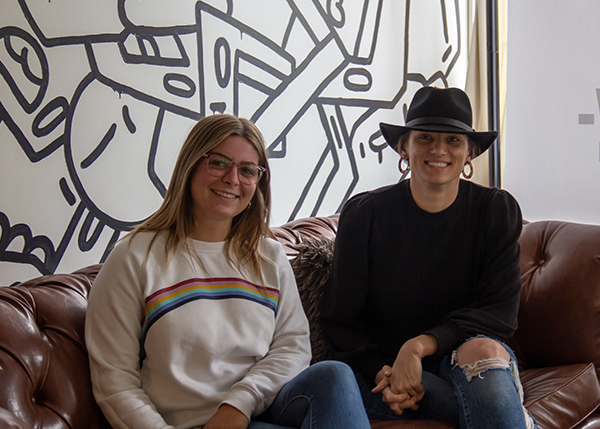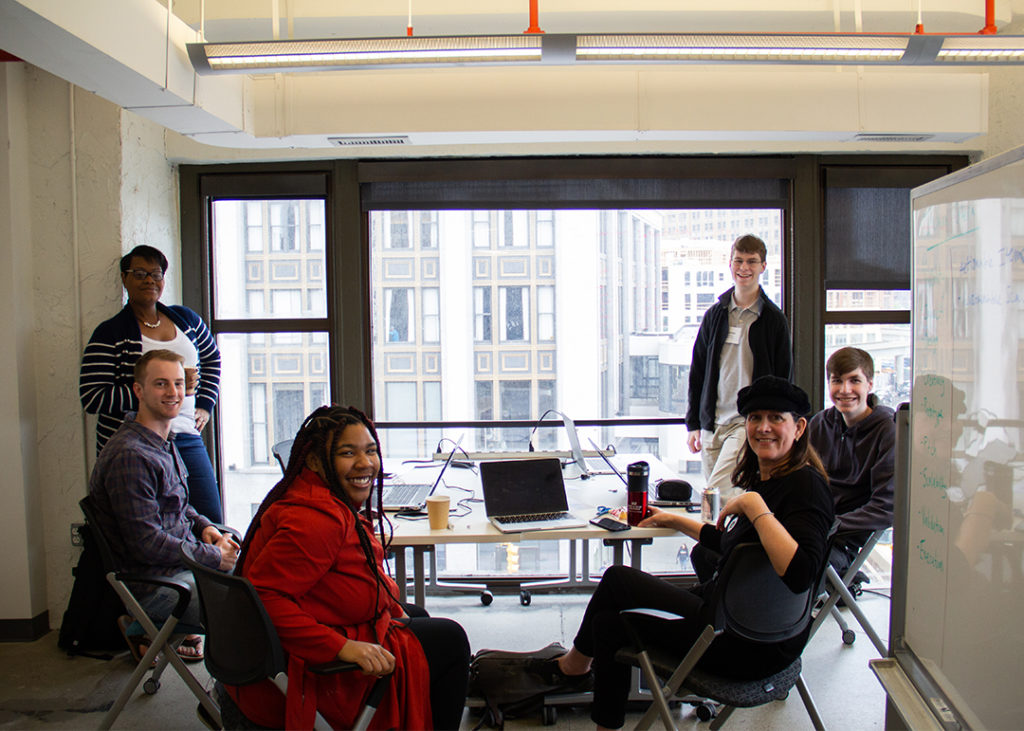Designers and Coders Come Together for Detroit Fashion + Tech Hackathon
May 20, 2019
By Cheryn Hong
Photography by Morgan Heinzmann
The 2019 Detroit Fashion + Tech Hackathon challenged designers and coders to find sustainable solutions for the fashion industry. They had 36 hours to complete the challenge.
The Grand Circus Detroit this past weekend held the Detroit Fashion + Tech Hackathon, a 36-hour challenge for creative designers and developers to solve the biggest problems faced by the retail industry today.
Lori McColl, the founder of Detroit Fashion + Tech Hackathon, began the competition last year. With a background in technology and automotive, along with a passion for fashion, she began to notice issues with not only the fashion industry, but with its sustainability, workers and global environmental impact.

Kate Partington from Pure Michigan Business Connect and founder of the Fashion + Tech Hackathon Lori McColl.
“I realized there are a lot of problems that I wasn’t aware of as a consumer, and as someone who comes from technology, my brain is always working to think about why things are the way they are,†McColl says. “I put on a hackathon because I wanted to see who was out there — what creatives and technology skills do we have in Detroit, who can really push for innovation.â€
This year’s challenge was to “create a solution, leveraging technology or data, that reduces environmental textile waste. This solution can support the designers/brands or consumers who are looking for new ways to reduce their environmental footprint.†A second option was to “create a solution that helps emerging brands asses which channels and pop-ups would deliver the most return on their investment.â€
“If you do some research, anything you care about as a human, the fashion industry has really disappointing statistics around it,†McColl says. “Eighty percent of the workers in overseas factories are women, it takes 200 gallons of water to make a pair of jeans, the amount of textile waste in the process is atrocious, as well as the way they’re disposing dyes in the river.â€
Janiece Williams of Belleville, Kristina Rudolph of Canton, Shannon Ramelot of Detroit and Julianna Saad of Royal Oak attend the 2019 Detroit Fashion + Tech Hackathon.
The participants included a diverse group of designers and coders. Jordan Blackwell, an engineer for five years at General Motors and a fashion blogger, took an interest to this year’s challenges. She says she believes that the hackathon is a great opportunity to show people the intersectionality between fashion and technology.
“This event is showing that we really need to intersect in order to come up with better solutions to these issues,†Blackwell says.
Ani Mayasandra, a fashion designer and musician, also participated. With a background in advertising, marketing and analytics, fashion is something new for Mayasandra who says he always had a creative itch he wanted to satisfy. The hackathon made him consider issues surrounding the fashion industry, he says.
“Sustainability is something I try to focus on as well, but especially how to make it feasible for bigger brands. I don’t get to dedicate my time to things like this, and I really wish I could,†Mayasandra says. “This is an opportunity to do just that, and this is really interesting because this is the future of fashion — how clothes are going to sell in retail and how the clothes are going to be made with the aspect of sustainability.â€
Austin Davis of Ferndale works on his team’s prototype.
After the 36 hours the teams presented their solutions to a panel of judges Sunday morning. The first place and $800 prize was given to team DEVIATE and their PoPP solution. The team members included Cassidy Tucker, Kelsey Tucker, Matt Gotschall, and Vincet Bey. They created a solution to retail pop-up problems with a prototype of a mobile app that connects a community of brands, customers and pop-up locations. The app allows brands to engage with customers, share their pop-up locations and deliver analytics to help brands make better decisions around the locations they select.
Team Deviate Detroit at the 2019 Detroit Fashion + Tech Hackathon: Matt Gotschall of Detroit, Cassidy Tucker of Detroit, Vincent Bey of Warren, and Kelsey Tucker of Plymouth.
Team Deviate Detroit at the 2019 Detroit Fashion + Tech Hackathon: Matt Gotschall of Detroit, Cassidy Tucker of Detroit, Vincent Bey of Warren, and Kelsey Tucker of Plymouth.
McColl says she hopes the dozens of participants took away a significant lesson from the event.
“Our overall mission is that we put Detroit on the map globally for innovation in the retail and apparel manufacturing space,†McColl says. “My goal is to start this community of people that think and create differently, and I believe we can become one of the biggest innovation hubs in the United States.â€
